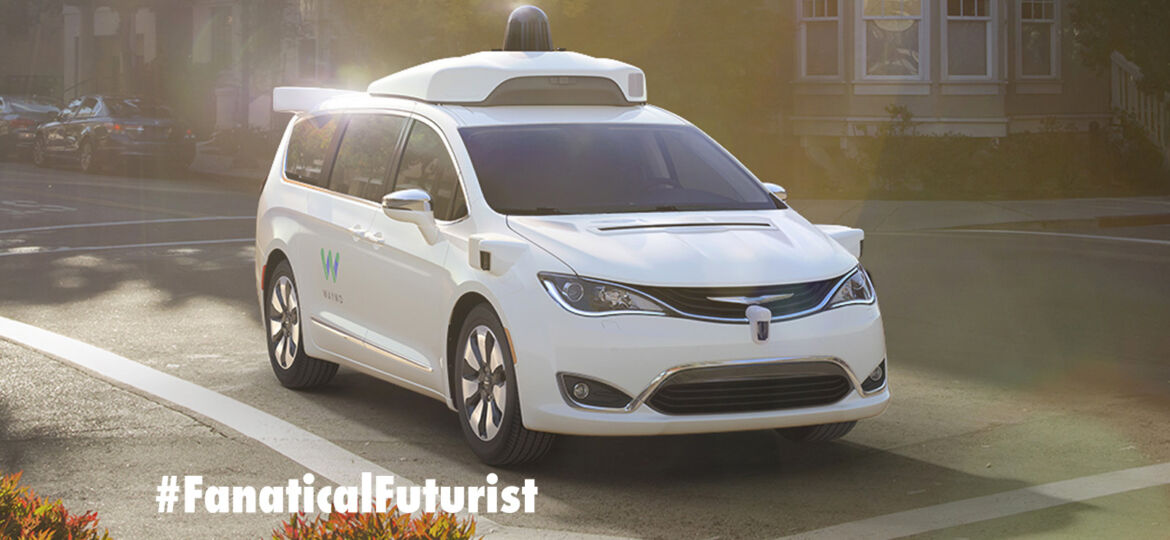
WHY THIS MATTERS IN BRIEF
The self-driving car revolution will arrive earlier than many people expect, because global companies are in an arms race to own the “new” future where cars are provided as a service.
It’s evident to anyone who’s been following the progress and roll out of driverless cars that Waymo’s self-driving mission, whose first public service, albeit a limited one, went live earlier this year, is about to mushroom, and that’s not been to left go unnoticed by Ford, and others, who recently announced they’re going to roll their own driverless car fleet out in 2021…
The Alphabet owned autonomous car company announced Thursday that it is significantly ramping up its partnership with Fiat Chrysler (FCA) and over time will add up to 62,000 Pacifica Hybrid minivans to its fleet, and that’s a significant bump from a January announcement in which Waymo, which started out as Google’s self-driving car project in 2009, said it would add “thousands” of new FCA minivans.
The news speaks to the quickening pace of Waymo’s development of fully self-driving vehicles, which have been testing around the Phoenix area for more than a year. Currently, a select group of users have been demoing Waymo’s self-driving ride hailing service, but the company plans to open it to the public in the Arizona city later this year.
There are as yet no details on how such a service would work and how much it would cost users but ride hailing companies such as Lyft and Uber, who themselves are now also moving onto the next autonomous vehicle service, flying taxis, have also been pushing hard in the self-driving car tech space because removing the driver from ride hailing would radically improve their bottom line.
“Waymo’s goal from day one has been to build the world’s most experienced (artificial) driver and give people access to self-driving technology that will make our roads safer,” said Waymo CEO John Krafcik in a statement.
Sergio Marchionne, CEO of Fiat Chrysler, added that strategic partnerships with technology-focused companies — a popular approach for big automakers of late — “will help to drive innovative technology to the forefront.”
So far, FCA has provided Waymo with around 600 minivans, which are built to Waymo’s specifications to accommodate the installation of the company’s various autonomous car sensors, namely radar, cameras and LiDAR, or light detection and ranging lasers. Those sensors help self-driving cars see their environment and react accordingly.
Autonomous car testing was thrust into the spotlight in March when an Uber self-driving Volvo SUV killed a pedestrian in Tempe, Arizona. Uber immediately halted all of its autonomous testing, and then pulled out of Arizona altogether.
The ride hailing company says it will resume testing in San Francisco, Pittsburgh and Toronto after federal investigations into the crash are completed, with a preliminary report indicated that while the Uber’s sensors detected the pedestrian well before the actual collision, the car’s computer wasn’t sure how to categorise what it was seeing and delayed its reactions by over six seconds.
Recent crashes of Tesla cars while on Autopilot, the electric automaker’s name for its driver assist features that require human oversight, have also renewed discussion about how technology is changing the driver experience.
While many driver assist features such as lane keeping and adaptive cruise control can ease fatigue and even save a driver in an emergency, some of the Tesla accidents suggest drivers often abdicate their responsibilities and get distracted by other tasks.
A recent Tesla crash in Utah was the result of the driver not touching any controls for 80 seconds, she said she was looking at her phone, until the vehicle slammed into a stopped fire truck at 80 mph.
Automakers appear torn between touting new driver-assist features in futuristic ads while also warning drivers in manuals and with visual and audio prompts that they must stay focused on the road.
Such features, which are categorised as Level 2 systems, are different from autonomous systems being developed by Waymo and others, which are considered Level 4 and 5 systems and don’t require driver input.
Some companies will begin testing self-driving cars without safety drivers in some states soon, and others , such as Audi, who recently touted their Long distance Long concept, and Toyota, who recently showed off their e-Palette concept, have suggested future cars will not have steering wheels or pedals.
While Waymo has built and tested a prototype two person car that has no controls, its growing fleet of consumer facing vehicles will apparently be far more traditional. Besides the growing partnership with FCA for Pacifica minivans, Waymo, whose cars have now racked up over 6 million miles on public roads and over 5 billion miles in simulators, also announced it’s inked an agreement with Jaguar Land Rover, who, no surprise are also testing their own vehicles, for 20,000 I-PACE vehicles.
So far, what accidents that have been reported by the company and authorities involving Waymo cars largely been the fault of human drivers hitting the Waymo car, typically from behind after they thought the Waymo car was going to proceed, but as more driverless cars start hitting the roads let’s hope that the number of road accidents and injuries, whether it’s the fault of the car or the driver, plummets.
















